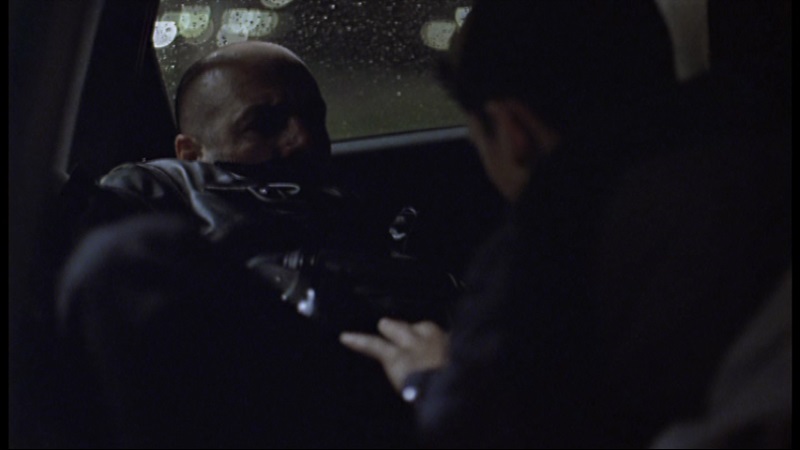
O Fantasma is a 2000 Portuguese film directed by Joao Pedro Rodrigues. It concerns Sergio, a young man working as a night time garbage collector in Lisbon, and his sexual development.
Sergio is, to say the least, alienated. He inhabits a largely empty night-time world. While he flirts with a female co-worker, Fatima, his main sexual connections with others are wordless, anonymous sexual encounters with men. Not only does he connect to the company’s mascot dog, he’s animal-like himself. He rarely speaks, and often sniffs and licks people and things. Sergio just doesn’t have the social vocabulary to express his sexual identity. He operates more on intuition.
Just as Sergio’s sexual development is unformed and amorphous, so does the film refuse to conform to cause-and-effect narrative. Things just happen. Sergio, out walking his employer’s dog, happens to find a police officer, gagged and handcuffed, in a parked car. There’s no explanation how he got there. Sergio just takes the sexual opportunity as he finds it and gives the man oral.

When collecting garbage from a house, Sergio meets a handsome biker named Joao. In a bag of old clothes, he finds a pair of damaged black leather motorcycle gloves, presumably once belonging to Joao. He later masturbates with them. In later scenes, Sergio spies on Joao at home, steals his torn black swimsuit from the trash (which Sergio sniffs and wears), and even breaks into his house and masturbates on his bed. His harassment of Joao brings him into contact with menacing cops, one of whom might be the officer he found in the car.
Through unexplained means, Sergio acquires a full-body black rubber suit and hood. The powerful men in Sergio’s world wear black leather jackets: Joao, the cops who harass him, and Virgilio, his boss who is having an abusive affair with his co-worker Fatima. Sergio is adopting the image of power, as he perceives it, but that also means he is losing his sense of humanity. The rubber suit means he is the alpha male, even the alpha dog, but it marks him apart. Before his final encounter with Joao, Sergio has sex with another, handcuffed man as the “top”, wearing the suit.
In the suit, Sergio sneaks into Joao’s house, handcuffs and gags him and drags him out into the street. What might become a rape is interrupted by a passing car, and Sergio abandons Joao and runs into the night.

The last sequence of the film is Sergio in the rubber suit, wandering through increasingly bleak, desolate post-industrial landscapes. Crouching or crawling, he searches for food, water and shelter among garbage. He is an outcast from humanity.

This does fit in with my idea that in film and television, fetishwear on men is often associated with a loss of identity, with depersonalization.
The final scenes ofO Fantasma are reminiscent of the sequence in the 1996 version of Irma Vep, in which the actress, wearing a rubber catsuit, sneaks through a luxury hotel. While that scene was about the freedom to find one’s own identity and pleasure and become a more developed human, Sergio only gains the freedom of the pariah.
One theory is that this can all be traced back to the character Frankenstein in Death Race 2000 (1975), played by David Carradine. “Frankenstein” is a supposedly immortal race car driver who champions the tyrannical government of a future America. Actually, it’s a code name for a series of drivers who replace the previous one after they die. Carradine’s character is just the latest.
There’s also the Canadian film I love a Man in Uniform (1993), in which a struggling actor gets a police officer’s uniform as a costume and starts wearing it full time. He finds the newfound power and respect intoxicating, and he becomes more violent and domineering.




[…] O Fantasma (2000): The Celluloid Dungeon […]
[…] O Fantasma (2000): The Celluloid Dungeon […]
[…] O Fantasma (2000): The Celluloid Dungeon A deep dive into the Portuguese film O Fantasma, and the protagonists sexual discovery. […]
[…] O Fantasma (2000): The Celluloid Dungeon […]
Is there any discussion in the film about homosexuality? Or is dialogue a non-issue in this movie?
It’s not a “discussion” kind of movie. Sergio can’t construct the idea of a homosexual identity, so expressing his sexuality means moving away from human society.